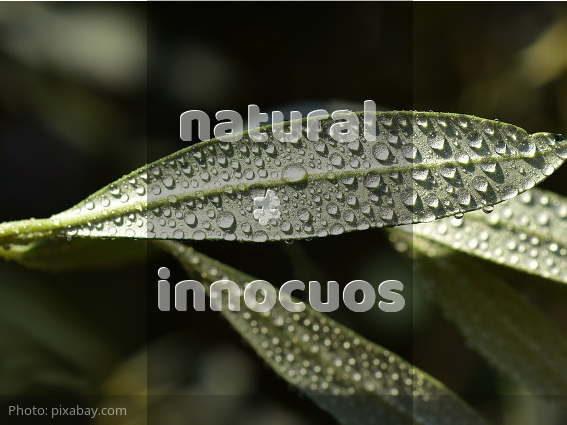Today we want to talk about the possible dangers of essential oils, diffusers and air fresheners for the health of your fellow animals, especially cats ...
NO ALL THAT'S 'NATURAL' IS INNOCOUS.
ESENTIAL OILS
are volatile organic components of plants are extracted from plants by distillation or cold pressing.
They contain:
- Phenols, to which cats are very sensitive. The higher the concentration, the greater the risk. High phenol oils are eg cinnamon, cloves, thyme, oregano, savory.
- Terpenoids (volatile), absorbed by inhalation, dermal absorption and oral ingestion through lick: Cajeput (melaleuca), pine, bitter orange (petitgrain).
- Limonenes: Citrus oils.
- Pine trees: pine and other coniferous plants, such as firs.
- Methiole Saliciates: Wintergreen and birch contain very high concentrations of methyl salicylate, toxic to cats - and people allergic to aspirin, with bleeding problems, asthma, epilepsy, pregnant or breastfeeding. Other essential oils that carry it are eg ylang ylang and gardenia.
- Hydrocarbons: Angelica, laurel, bergamot, cajeput, cedar, chamomile,citronella from Sri Lanka, clove, cumin, cypress, to name the most common ...
Other essential oils that cause poisoning in cats are peppermint, pennyroyal, eucalyptus, tea tree oil ...
We should never extrapolate positive effects on humans and even other animals to cats:
THE CAT'S ORGANISM IS DIFFERENT
Cats lack the enzyme glucuronyl transferase, present in most animals. This results in a slower elimination of toxins, accumulating in the body, causing problems that can be fatal.
BE CAREFUL WITH USING ESSENTIAL OILS AND AIR FRESHENERS / DIFFUSERS
Essential oils and other substances from them can pose a serious health risk to your cat by
- Inhalation - Shortness of breath, rapid breathing, gasping, coughing, or wheezing. Immediately transfer the cat to fresh air and if symptoms do not resolve quickly to the vet.
- Dermal absorption
- Ingestion when washing
Regardless of the route, they are metabolized in the liver, differently (and with more problems) than in other mammals.
Symptoms - (depend on oil and amount): drooling, vomiting, tremors, shortness of breath, low body temperature, low heart rate, ataxia, low and liver failure.
- Do not use diffusers with toxic oils (most are for cats) in your home.
- Do not pet your cat after applying essential oils on the skin (wash your hands well and keep the treated skin covered to avoid rubbing with your cat's fur).
- Don't use toxic oils to clean anything your cat may lick or rub.
IMPORTANT: The development of liver damage can be a slow process without any visible symptoms.
TEA TREE OIL
Aceite Melaleuca, Tea Tree Oil, botanical: Melaleuca alternifolia (Myrtaceae).
Endemic to Australia. The oil is obtained by distilling the leaves. It is a mixture of powerful, pharmacologically highly active substances (terpenes and phenols). Because the concentration and composition can vary considerably from one product and / or batch to another and occasionally it is also adulterated and poses an incalculable risk for use in cats and dogs.
Antimycotic and antimicrobial applied topically for various human conditions. Although there are few studies that affirm its effectiveness and safety. Poisonous if swallowed.
Toxicity to cats
Moderate to severe (life threatening)!
Even a few drops applied to the skin and ingested during grooming can lead to severe poisoning. Being fat soluble and easily penetrating the skin, it increases toxicity. And although a prop application does not show visible symptoms of poisoning, long-term consequences cannot be excluded, especially after repeated use.
Symptoms of poisoning
Low body temperature, weakness, restlessness, wobble, inability to walk, tremors, increased liver enzymes. It is not uncommon for the poisoning to end in a coma and the cat's death.
There is no specific antidote for tea tree oil poisoning.
Therapy consists of avoiding further absorption, detoxification and monitoring of vital signs.
Adverse effects are known in rats, rabbits, cats, dogs, and humans.
NEEM OIL
Nim, Margosa of India or Nimbus of India, botanical: Azadirachta indica (Meliaceae).
Native to India, Nepal, Pakistan, Bangladesh, Sri Lanka, and the Maldives. Cultivated in tropical and semi-tropical regions. The oil is obtained from its fruits and seeds. It contains insecticidal compounds (azadirachtin, which acts as a growth disruptor and salanine) and other unknown compounds with fungicidal activity.
The main use of Neem Oil is for pest control in homes, plantations and gardens. It is effective against scabies, bed bugs, fleas (as a growth inhibitor during the larval stage), a fungicide to protect crops and gardens against mites, aphids, thrips and whiteflies and fungi. As a bio-fertilizer, facilitating the absorption of nitrogen in plants and helping them to grow.
Dermal care: Its abundance in triglycerides, calcium, vitamin E and essential fatty acids rejuvenate the skin and reduce acne and eczema.
Toxicity to cats
Neem Oil is toxic to cats. So its use in houses or gardens with cats is not recommended. Even the same producers (neemtreefarms.com) do not recommend use in cats because it is almost always mixed with essential oils to cover their strong sulfur / garlic odor and they can cause liver damage.
Symptoms of poisoning
Lethargy, hypersalivation, ataxia, tremor, spasms, seizures, increased muscle activity. The mechanism of toxicity is unknown.
There is no specific antidote for Neem Oil poisoning.
Adverse effects are known in rats, rabbits, cats, pigs, humans.
INFORM YOURSELF WELL - DON'T PUT YOUR CAT'S HEALTH AND LIFE AT RISK.
Related posts
YOUR CAT'S HEALTH - various posts on our blog > tips for life with cats
YOUR CAT - ALWAYS SAFE - various posts on our blog > tips for life with cats

